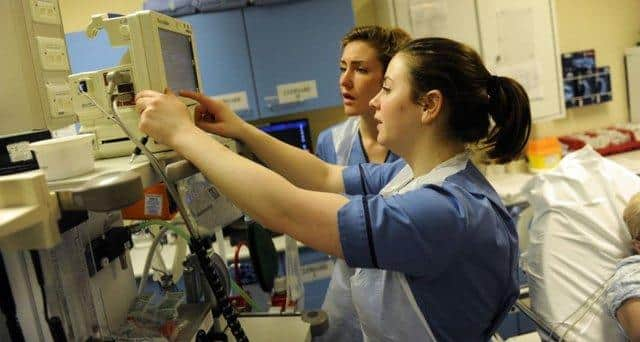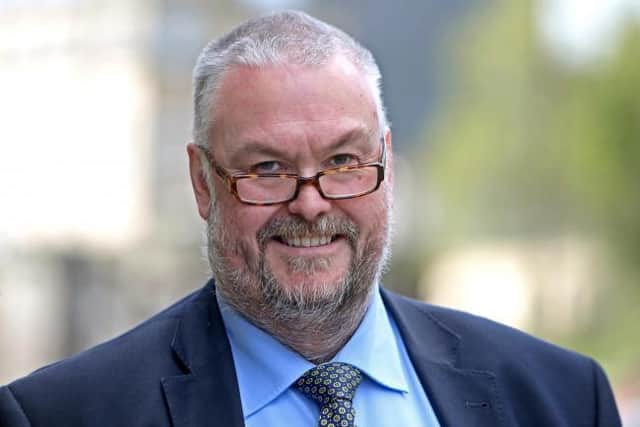Covid Scotland: NHS needs radical 'whole system' reform, says former chief
Professor Paul Gray, who was chief executive of NHS Scotland for six years up until 2019, said Covid-19 had accelerated the existing crisis, but that systemic problems meant an overwhelmed NHS was inevitable even before the virus hit and the virus “simply brought the date forward”.
His declaration comes after the SNP faced accusations in recent weeks of leading the NHS into crisis, amid fears over mounting pressures caused by hospital bed and nursing shortages, missed waiting time targets and a huge backlog in operations.
Advertisement
Hide AdAdvertisement
Hide Ad

The latest Covid figures showed one new death from Covid in the 24 hours to Sunday and 2,040 new cases were recorded over the same period.
It brings the total death toll since March last year – of people who first tested positive for the virus within the previous 28 days – to 8,666.
Writing in a blog for independent think-tank Reform Scotland, Prof Gray called for an end to the “political bunfight while people suffer and die”.
He urged politicians to stop arguing about increasing investment to address major problems like waiting times, claiming it was “no more than posturing” without a redesign of the way resources are used.


“If the NHS is truly precious, it deserves a robust diagnosis, and it requires radical surgery,” he writes.
"More money is needed, but it is far from the whole answer. For a start, there is not a cupboard full of trained and experienced professionals just waiting to be recruited.
"Pointing to failures in access, or promising to fix those failures – largely visible through waiting times – without a willingness to engage on system design or restructuring the way resources are applied is no more than posturing.
“Unless the opposition is prepared to go beyond beating the government of the day over the head with the present situation, and unless the government is willing to engage constructively in radical change and stop arguing about increasing investment – record investment in something that isn’t working will not make it work – we will stay on this merry-go-round.”
Advertisement
Hide AdAdvertisement
Hide AdProf Gray called for Scotland to learn from countries like Sweden where integrated systems are delivered at a local level, with less need for central control. He also wants to see frontline staff as well as citizens to have a say in what reforms are needed.
“NHS Scotland requires radical surgery,” he writes.
"It is time for us to look to Sweden, the Netherlands, Alaska, and other international examples, to embrace local decision-making, to promote the contribution of the voluntary sector, to recognise where the private sector adds value, and to create a health and care service for the future, with access, quality and sustainability at its core.
"For as long as the delivery of health and care services is split across a range of providers where the incentives, governance, political mandate and accountability mean that the different budget holders can have adverse impacts on their partners, the issue will not turn to the needs of patients and families or the intractable issues of population health.
"The issue will be a series of budget and resource challenges where increasing demand will drive increasingly perverse incentives, to the detriment of the people who actually need diagnosis, care and treatment.”
Scottish Liberal Democrat Leader Alex Cole Hamilton said: “These startling revelations give lie to the Scottish Government insistence that the crisis in the NHS is a result of the pandemic.
"We’ve known for years about chronic under-staffing, workforce planning issues and funding problems crippling our health boards. The government has been asleep at the wheel, ignoring the warning lights blinking on the dashboard.
"The health secretary needs to get to grips with the crisis and stop dismissing problems as being caused by Covid-19.”
Chris Deerin, director of Reform Scotland, backed calls for debate on reforms, saying there was “no time to wait”.
Advertisement
Hide AdAdvertisement
Hide AdA Scottish Government spokesperson said: “The pandemic has been the most significant challenge the NHS has ever faced in its 73-year history. We know that the pandemic is not over and that Covid-19 and other pressures will continue to impact the NHS for some time.
“Our NHS Recovery Plan sets out commitments over the next five years, backed by over £1 billion of funding, to support an increase in inpatient, day cases, and outpatient activity to address backlogs, which will be supported by the implementation of sustainable improvements and new models of care.”
“This includes our commitment to deliver a National Care Service by the end of this Parliament in order to help improve the provision and consistency of care services across Scotland.”
NHS Scotland were contacted for comment.
A message from the Editor:
Thank you for reading this article. We're more reliant on your support than ever as the shift in consumer habitsbrought about by Coronavirus impacts our advertisers.If you haven't already, please consider supporting our trusted, fact-checked journalism by taking out a digital subscription.
Comments
Want to join the conversation? Please or to comment on this article.
